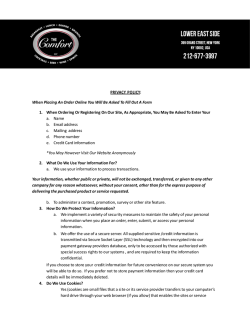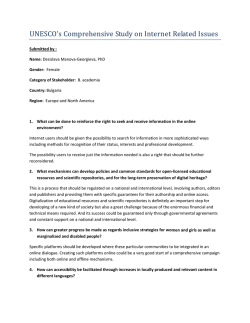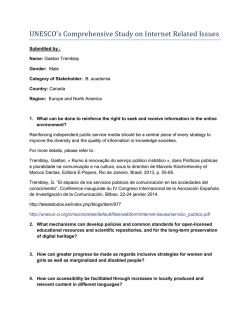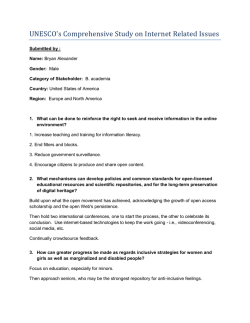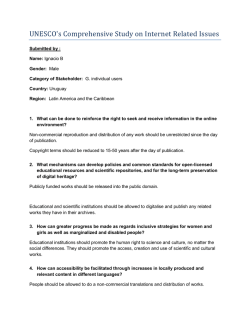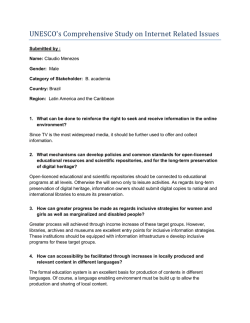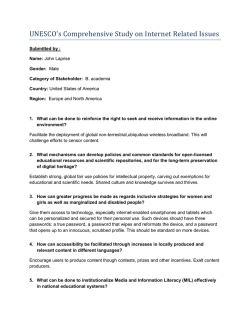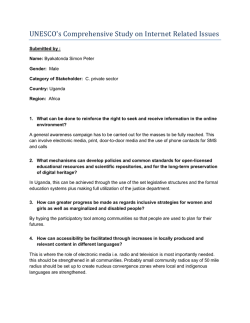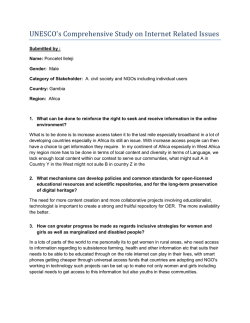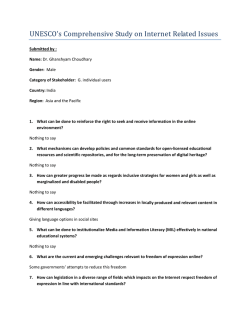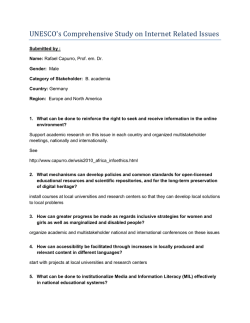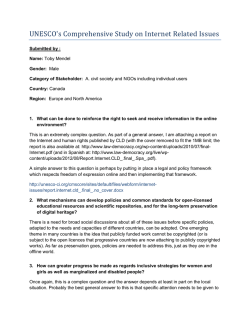
Katrin Nyman Metcalf
UNESCO's Comprehensive Study on Internet Related Issues Submitted by : Name: Katrin Nyman Metcalf Gender: Female Category of Stakeholder: A. civil society and NGOs including individual users Country: Estonia Region: Europe and North America 1. What can be done to reinforce the right to seek and receive information in the online environment? National legislation on access to information is important, regardless of the form (electronic or other) of the information. States should use the opportunities ICT provide to enable easier access, regardless of location, etc. The international community can push for this by highlighting access as a best international principle - but the key is the content of the information, not its technical shape. 2. What mechanisms can develop policies and common standards for open-licensed educational resources and scientific repositories, and for the long-term preservation of digital heritage? Having common platforms for education that mean that courses can be interchanged is of benefit for all, there is a clear network effect in that once there are several participants, it becomes interesting for others as well. Thus it makes good sense for international organisations like the EU, World Bank, UN organs, etc. to give grants to develop interoperable courses, databases etc. to get it going. International coordination work on formats etc. is needed, (quite) successful already in the EU but less so globally. Here international conferences of those concerned are probably the best, even if not a very rapid tool. 3. How can greater progress be made as regards inclusive strategies for women and girls as well as marginalized and disabled people? In some countries there is no need for special policies for women as there are no real obstacles and an excessive emphasis on this deflects from real issues. A common understanding of the importance of an inclusive policy is important and should be stressed as a best international practice but each country has to see which groups are in need of special attention. 4. How can accessibility be facilitated through increases in locally produced and relevant content in different languages? Basic information especially in an e-governance context needs to be made by local and national authorities and the cost for this covered by them. Cultural grants and similar can support local culture but apart from this, the market will determine what people consume and it would be dangerous from a freedom of expression perspective to start interfering with this on the pretext of supporting local culture or language. 5. What can be done to institutionalize Media and Information Literacy (MIL) effectively in national educational systems? Access to free resources from international organisations, events to get relevant persons in countries interested - not high-level plans but rather giving access so that plans are made at appropriate level, 6. What are the current and emerging challenges relevant to freedom of expression online? As freedom of expression means also unpleasant speech should be allowed with only very few and proportional restrictions, it is a challenge to draw the line of what is proportional for example in regard to potentially inflammatory, inciting speech, where a threat of terrorism and similar naturally means authorities get nervous. But freedom of speech should not be compromised, existing principles on proportional possibility to restrict some speech can be used but not new restrictions created. The way modern media, especially social media, impacts on privacy also leads governments to impose excessive restrictions as it does not know how else to deal with the risks, as people themselves are not aware of how to deal with it. 7. How can legislation in a diverse range of fields which impacts on the Internet respect freedom of expression in line with international standards? Strong emphasis on the freedom as set out in international human rights instruments, together with the case law from international bodies that interpret these instruments (like the ECtHR for detailed case law). These best international principles should form the backdrop to specific rules, be propagated by those working internationally in the field. 8. Is there a need for specific protections for freedom of expression for the Internet? No, this risks creating new loopholes to exploit for limiting it. See the previous answer. New ways to interpret existing principles are needed, not changing the principles. 9. To what extent do laws protect digitally interfaced journalism and journalistic sources? The question of who is a journalist is becoming harder and harder to answer so law should as much as possible not be dependent on this. This means no general accreditation (only to events), no special access to information for media but as much transparency as possible for everyone, not a lot of special media law at all, but an emphasis on self-regulation to which digital media should be encouraged to subscribe. Courts will have to determine in cases that still do occur if a modern media representative should be seen as a journalist in whatever the context - this to be decided ad hoc only in a case by case manner. 10. What are the optimum ways to deal with online hate speech? How can Media and Information Literacy empower users to understand and exercise freedom of expression on the Internet? Existing laws and principles allow for some restrictions, although the jurisdiction issue makes this complicated. In international cooperation such existing principles should be used as a basis and networks can be established between authorities in different countries to be able to cooperate more rapidly in case of need. Education, starting from small children but also encompassing all groups of society. 11. What are the optimum systems for independent self-regulation by journalistic actors and intermediaries in cyberspace? Voluntary groupings with a wide membership of traditional media and modern media, elaborating codes of conduct and having a system for implementing them with a real enforcement capacity (even if it will be essentially voluntary, members can decide on e.g. a fine system). For internet service providers and similar, a co-regulation system with self-regulation as far as possible but also regulatory oversight by an independent regulatory authority. 12. What principles should ensure respect for the right to privacy? Existing principles from international human rights instruments like the ECHR - with proportionality, difference for public figures and matters of public interest, special regard for vulnerable groups. No new rules needed. 13. What is the relationship between privacy, anonymity and encryption? Anonymity and encryption (as a tool to allow anonymity) can be used when there is no harm in this, for example in on-line chats or comments, where there is an ultimate possibility (though registration) to find out where something comes from in case of illegal (inciting, privacy violating) content, but where normally people may want to be able to discuss privately. Total anonymity without having to in any way divulge your identity would rarely be justified. 14. What is the importance of transparency around limitations of privacy? There are established best international practice that holds privacy as a reason to limit transparency, but in democratic countries the limitations should be proportional: is there really a need to keep certain information private, does it have potential harmful effects if it comes out and what does the public interest test say? There is no need for new rules for internet, just a recognition that the content of the information and not its form is relevant (so e.g. not having the IT departments of authorities decide on access issues, but persons competent to evaluate the content.) 15. What kinds of arrangements can help to safeguard the exercise of privacy in relation to other rights? See above, no need for new rules. Education of children as well as other groups so they know what they share with others and how is important, the private sector (social media) has a clear role to play - not least in making the education attractive and interesting, 16. How can openness and transparency of data be reconciled with privacy? See above. We do not need new privacy rules, we still need to see what is the data that is available or not - what is its content. ICT can be used more to enhance privacy, by e.g. any official action in databases leaving a digital footprint that the concerned person can see; by clear logs of who has accessed what information within authorities etc. 17. What may be the impact of issues relating to big data on respect for privacy? People have to get used to thinking more about their privacy and assessing if something needs to be kept private. Normally in a modern society much relies on data being available and people are getting used to this and living accordingly - people e.g. like to use GPS and presumably do not mind that their location is known to various service providers, which is normal: we get a service and why should it for most people be secret where they are? Still there is a certain education gap however, which sometimes also leads to panic and fear as people do not understand what data is available and if there are any risks, thus exaggerating the risks and making the relatively few legitimate privacy cases even more complex. 18. How can security of personal data be enhanced? By cooperation between technical and legal staff, to create secure IT systems that have a clear framework in law regarding who is responsible for them, how can complaints be made, how is it ensured not only that a footprint is left by all transactions (IT issue) but that this can be accessed etc. (legal issue). 19. How can Media and Information Literacy be developed to assist individuals to protect their privacy? Education in schools, harnessing the social media itself (see above) to make attractive campaigns. 20. How can ethical principles based on international human rights advance accessibility, openness, and multi-stakeholder participation on the Internet? Self- and co-regulation for actors in the area (see above), education, discussion - ethics cannot be enforced! 21. What conceptual frameworks or processes of inquiry could serve to analyse, assess, and thereby inform the choices that confront stakeholders in the new social uses and applications of information and knowledge? An interdisciplinary academic approach (much more than until now where social and technical disciplines still operate too much separately) plus an integrative approach of business, government and civil society together with academia. In such setting the relevant frameworks can be developed. 22. How does ethical consideration relate to gender dimensions of the Internet? Gender discrimination is no worse or better on internet than elsewhere and is generally an issue that is given undue attention in states where it is a non-issue. The problems that occur are in states that have a general big problem with discrimination and can be addressed as a general issue (education of girls, legal rights for women). 23. How can ethics, - i.e. the simultaneous affirmation of human rights, peace, equity, and justice - inform law and regulation about the Internet? It should be a background for any discussions, in international for a and importantly including also business: as often business makes the decisions nowadays on ethical issues. 24. What international, regional and national frameworks, normative guidelines and accountability mechanisms exist of relevance to one or more fields of the study? Regionally in Europe EU is important but also ECtHR case law as human rights principles of also the pre-digital era remain relevant, in Europe there is a clear setting of best principles which can serve as inspiration for other parts of the world where such international principles do not exist so much, as it is easier to use an international framework as inspiration than rules from one other country. OSCE is important in its area, with an active Representative on Freedom of the Media dealing a lot with internet. Civil society organisations on freedom of expression, media, human rights are very active and in some cases have a cooperation with business which there is a need for to a greater extent. 25. How do cross-jurisdictional issues operate with regard to freedom of expression and privacy? Co-operation on a voluntary - but preferably institutionalised - basis is most often the only viable option. 26. What are the intersections between the fields of study: for example, between access and freedom of expression; ethics and privacy; privacy and freedom of expression; and between all four elements? All are closely connected and should never be seen as separate issues. 27. What pertinent information materials exist that cut across or which are relevant to the four fields of the study? 28. What might be the options for role of UNESCO within the wider UN system in regard to the distinct issues of online Access to information and knowledge, Freedom of Expression, Privacy and Ethical dimensions of the information society? As an expert body that shows how the mentioned issues are all connected, by concentrating on all areas as all being relevant for the mandate of UNESCO. Activities would include conferences and publications, but it may be better to fund activities actually carried out by others but with an UNESCO presence. 29. What might be options for the role of UNESCO in relation to stakeholders outside the UN system? See above, wide network of activities with UNESCO as one participant - expert - sponsor. Not to try to do too much by itself as all large, bureaucratic organisations have problems in a fastmoving world of new technologies - but can be essential support to others. 30. For each study field, what specific options might UNESCO Member States consider?
© Copyright 2026
